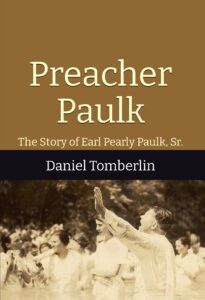I’ve been researching and writing on my late great uncle, Earl P. Paulk, Sr. (1904-1992). In 1957-1958, he published a three part article in the Church of God Evangel on Ministerial Ethics. His advice is both wise and timeless. It’s worth reading. Here are excerpts from my forthcoming book: Preacher Paulk – The Story of Earl Pearly Paulk, Sr.
The topic of ethics in ministry was a consistent theme in Paulk’s messages at ministers’ meetings and he modeled proper ethics in his life and ministry. Paulk insisted that a lack of ministerial ethics was “nothing but selfishness.” The key to ethics is “preferring one another” (Romans 12:10 KJV). Those who are called to “administer in church government” are to remember Peter’s admonition: “Feed the flock of God which is among you, taking oversight thereof, not by constraint, but willingly; nor for filthy lucre, but of a ready mind; Neither as being lords over God’s heritage, but being ensamples to the flock” (1 Peter 5:2-3 KJV). He insisted that all ministers, “from the pastor to the highest official” should follow the admonitions of Scripture to care for God’s people above all things.
Paulk said that it is unethical for those in authority to take undue advantage of others. Those in authority should be very careful not to embarrass or intimidate others. Furthermore, those in authority should respect ecclesiastical protocol and polity. Proper boundaries must be maintained. Ministers should keep commitments and appointments. Proper ethics demands that ministers respect the time of others and pastors should be considerate of evangelists’ livelihood.
Paulk insisted that Church of God ministers should consider their relationships with ministers of other Christian churches. Church of God pastors should participate in local Ministerial Associations. He was aware that other Christian ministers might not share holiness convictions. Even so, Pentecostal ministers should not isolate themselves lest they give the impression of arrogance or timidity. “If we as Pentecostal ministers will conduct ourselves properly, showing the right spirit, this will have an influence for good among others.” He insisted, “Having cleansed yourself from such things of the flesh and being filled with the Pentecostal experience, you will have an opportunity to let your light shine among them; and it is possible that by seeing your good works they will be constrained to glorify your Father and be convinced of the reality of holiness.” He encouraged Church of God pastors to visit with and welcome all new pastors of any denomination who moved into the community. This will certainly make a strong impression upon the new pastor and his congregation.

Paulk said that when a pastor assumed a new pastorate, he should be very careful not to make disparaging remarks about any former pastor. He acknowledged that some former pastors were worthy of criticism, but unfavorable remarks from a new pastor were not helpful. Paulk also advised that when visiting a former pastorate, pastors should first visit with the present pastor as a courtesy.
He encouraged Church of God ministers to be active in Parent-Teacher organizations, and other civic groups. He said, “By failing to attend and be active in the functions of such organizations, the pastor will also miss much needed information that could help him be a better minister in the town, city or community of which he is a part.” By participating in such groups, the pastor makes it known that he is genuinely concerned for the community.
Paulk insisted that Church of God ministers should conduct the business of the church in a prompt and proficient manner. He said, “The most important house or business in any city or place is the house of God.” A minister that fails to be prompt is “slothful about God’s business.” He declared, “Promptness in paying church bills is indispensable to real success. . . to be prompt in paying bills is the very foundation of good religion.”
Earl P. Paulk, “Ministerial Ethics,” Church of God Evangel (Sept 23, 1957), 4-5, 10.
“Ministerial Ethics – Part II,” Church of God Evangel (November 18, 1957), 4-5, 10. “
Ministerial Ethics – Part III, “Church of God Evangel (February 3, 1958), 6-7.
